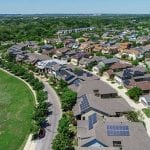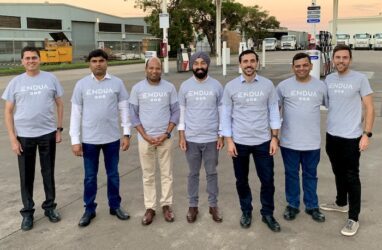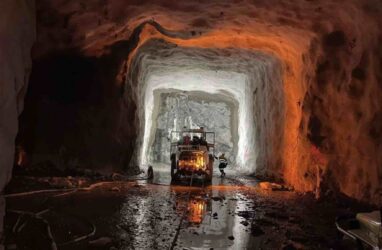Feed aggregator
Euro Markets: Midday Update
Per tonne CO2 payments can broaden from “projects” to “policies” -report
African minister calls for “integrity index” and ratings agency for global carbon markets
EU’s centre-right seeks to block nature restoration law in Parliament
Plastic waste puts millions of world’s poorest at higher risk from floods
More than 200 million face more intense and frequent floods due to plastic pollution blocking drainage systems, report finds
A devastating 2005 flood that killed 1,000 people in the Indian city of Mumbai was blamed on a tragically simple problem: plastic bags had blocked storm drains, stopping monsoon flood water from draining out of the city.
Now a new report, attempting to quantify this problem, estimates that 218 million of the world’s poorest people are at risk from more severe and frequent flooding caused by plastic waste.
Continue reading...SBTN launches first science-based targets for nature
‘Worthless’: Chevron’s carbon offsets are mostly junk and some may harm, research says
Exclusive: investigation finds energy giant’s efforts to offset its huge emissions rely on schemes with little impact
A new investigation into Chevron’s climate pledge has found the fossil-fuel company relies on “junk” carbon offsets and “unviable” technologies, which do little to offset its vast greenhouse gas emissions and in some cases may actually be causing communities harm.
Chevron, which reported $35.5bn in profits last year, is the US’s second-largest fossil fuel company with operations stretching from Canada and Brazil to the UK, Nigeria and Australia.
Continue reading...Europe’s grassland butterfly population down more than a third in 10 years
Decline worse in Britain than other countries, as conservationists blame agriculture and global heating
Butterfly populations that live on grasslands across Europe have declined by more than a third in the past decade, according to a study.
Seventeen species that were once commonly found in pastures and meadows across 22 countries, including the small copper, common blue and meadow brown, declined by 36% on average between 2011 and 2020.
Continue reading...Green hydrogen taskforce links Australia and India in race to renewable fuel
 In an industry-led push, the two countries agreed to share expertise and ideas in a new taskforce.
In an industry-led push, the two countries agreed to share expertise and ideas in a new taskforce.
The post Green hydrogen taskforce links Australia and India in race to renewable fuel appeared first on RenewEconomy.
Indonesia’s carbon buffer rules creating uncertainty for voluntary project developers, investors
Melbourne community group looking for home after winning funds for inner city battery
 Working out where to put the 120kW battery in densely built Richmond might be the most difficult part of the process.
Working out where to put the 120kW battery in densely built Richmond might be the most difficult part of the process.
The post Melbourne community group looking for home after winning funds for inner city battery appeared first on RenewEconomy.
Virgin Orbit: Branson’s rocket dream ends after mission failure
New framework will allow firms to assess their impact on nature
Science-Based Targets Network says new schema will ‘get nature into the boardroom’ in the same way as climate footprints
Businesses can now assess their impacts on nature loss using science-based targets as part of a move to “get nature into the boardroom”.
Research shows that the biodiversity crisis is as serious as the climate crisis, yet there is less information about how companies drive nature loss, because this data is not being disclosed. The Science-Based Targets Network (SBTN) is providing the first framework for companies to report their impacts on nature as part a new frontier of corporate environmental reporting.
Continue reading...Chemical cocktails harmful to wildlife found in 81% of English rivers and lakes
Campaigners call for rigorous testing of waterways to protect species after analysis reveals scale of problem
Chemical cocktails that are harmful to wildlife have been found in 81% of river and lake sites tested in England, a study has found.
Wildlife organisations are calling on the government for more rigorous testing of waterways for chemical cocktails, and new legal protections against dangerous mixtures, including requiring assessments of potential hazardous chemical mixture impacts before any new chemical is allowed on the market.
Continue reading...Australia needs 20GW renewables in four years to meet 2030 target
 To reach 80 pct renewables by 2030, we need 20GW of wind and solar committed in four years, and six years for transmission to be built. That’s a doubling of the historic pace.
To reach 80 pct renewables by 2030, we need 20GW of wind and solar committed in four years, and six years for transmission to be built. That’s a doubling of the historic pace.
The post Australia needs 20GW renewables in four years to meet 2030 target appeared first on RenewEconomy.
Victoria falls in line on dynamic rooftop solar exports, to make homes ready for electrification
 Solar Victoria announces raft of rule changes and recommendations to make solar homes "future ready," including for a shift to all-electric appliances.
Solar Victoria announces raft of rule changes and recommendations to make solar homes "future ready," including for a shift to all-electric appliances.
The post Victoria falls in line on dynamic rooftop solar exports, to make homes ready for electrification appeared first on RenewEconomy.
Cooperation with the US could drive Australia’s clean energy shift – but we must act fast
Australian start-up raises $11.8m for small scale hydrogen ‘battery’
 CSIRO-backed hydrogen hopeful Endua has raised another $11.8 million from existing and new investors to develop its 100 kW hydrogen energy storage unit.
CSIRO-backed hydrogen hopeful Endua has raised another $11.8 million from existing and new investors to develop its 100 kW hydrogen energy storage unit.
The post Australian start-up raises $11.8m for small scale hydrogen ‘battery’ appeared first on RenewEconomy.
NSW Energy Security Corp to address “spiralling costs” of pumped hydro projects
 NSW energy minister Penny Sharpe says the Energy Security Corp will help address the spiralling costs of pumped hydro which lost out to battery storage in a recent tender.
NSW energy minister Penny Sharpe says the Energy Security Corp will help address the spiralling costs of pumped hydro which lost out to battery storage in a recent tender.
The post NSW Energy Security Corp to address “spiralling costs” of pumped hydro projects appeared first on RenewEconomy.
Recycled plastic can be more toxic and is no fix for pollution, Greenpeace warns
Campaign group says plastics are incompatible with circular economy as countries prepare for treaty talks
Recycling plastic can make it more toxic and should not be considered a solution to the pollution crisis, Greenpeace has warned before the latest round of negotiations for an international plastics treaty.
“Plastics are inherently incompatible with a circular economy,” the global environmental network said in a report that brings together research showing recycled plastics are more toxic than their virgin constituents.
Continue reading...


